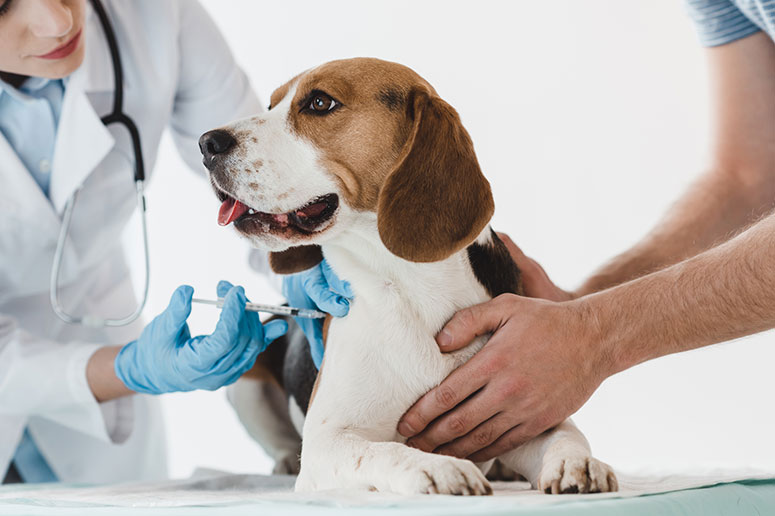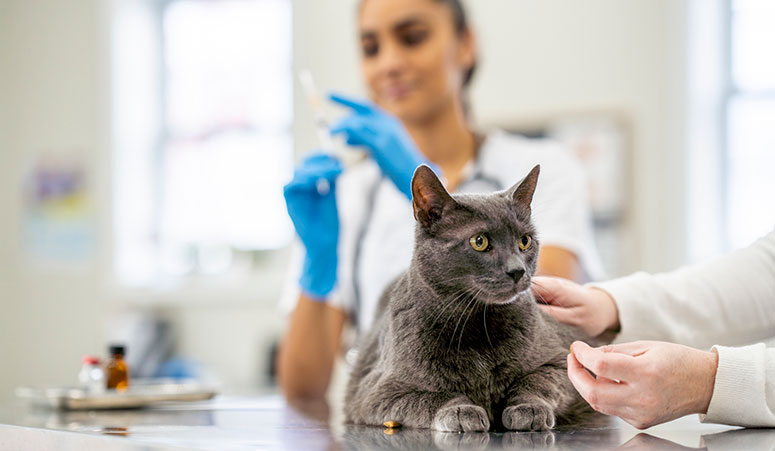Key Takeaways
- An growing variety of folks categorical considerations over the advantages of vaccination, and now that hesitancy is increasing to pets.
- The small dangers related to vaccines are far outweighed by the dangers related to vaccine-preventable illnesses, most veterinarians agree.
- Some vaccines for pets are solely wanted one time, whereas others require boosters yearly or each few years.
Because the COVID-19 pandemic began in early 2020, there’s been a marked improve within the variety of people who find themselves skeptical of vaccinations, primarily as a result of misinformation. Even some presidential candidates and high-ranking public officers forged doubt on the worth of human vaccines.
Well being researchers estimate that COVID-19 vaccinations doubtless saved 2.4 million lives between January and August 2021. Regardless of this success, an growing variety of folks categorical considerations over the advantages of vaccination.
However that wariness doesn’t simply affect people – a study printed within the journal Vaccine final fall revealed that greater than half (53 p.c) of canine homeowners maintain adverse views of canine vaccines. Of that quantity, 37 p.c questioned the security, 22 p.c questioned the efficacy, and 30 p.c questioned the significance of vaccines for canines.
That reluctance is already having tragic penalties for unvaccinated canines and cats, who’re getting sick and even dying of totally preventable situations. As well as, pet insurance coverage corporations, together with Healthy Paws, could not cowl therapy of vaccine-preventable illnesses – except a vet recommends towards vaccination for a selected pet as a result of an underlying medical problem – since prevention is taken into account a part of being a accountable pet father or mother.
“We regularly see points in human medication spill over to veterinary medication, and that appears to be the case with vaccine hesitancy,” says Cathy Barnette, DVM, a consulting veterinarian for Wholesome Paws. “There have all the time been occasional pet homeowners who resisted vaccines, however sadly, this appears to have turn into extra widespread throughout the pandemic.”
People who find themselves involved about over-vaccinating pets fear they might stress the immune system, trigger opposed reactions, and contribute to long-term power illnesses. Nevertheless, veterinarians overwhelmingly suggest pet dad and mom get animals vaccinated, in response to the American Animal Hospital Association’s (AAHA) vaccination tips for dogs and cats.
Are vaccinations secure for canines and cats?
Vaccines can have negative effects; that’s true. The most typical results embody lethargy, diarrhea, and decreased urge for food. Thankfully, extreme reactions are very uncommon. The small dangers related to vaccines are far outweighed by the dangers related to vaccine-preventable illnesses, Dr. Barnette mentioned. The truth is, veterinarians take this risk-benefit calculation under consideration when making vaccine suggestions. Vaccination recommendations are often geared toward extremely contagious pathogens for situations with a excessive fatality price.
Canines and puppies continuously die of situations corresponding to canine distemper and parvovirus, which may each be prevented by holding canines up-to-date on vaccines. Individuals who don’t vaccinate their pets additionally put different folks’s pets in danger, as these illnesses are extremely contagious.
Attainable well being dangers to people
Within the case of zoonotic illnesses, or illnesses that may cross from pets to folks, failure to vaccinate can affect human well being. Whereas uncommon within the U.S., rabies is an particularly harmful illness. A pet with rabies will die, and anybody bitten by the pet can even die in the event that they don’t get handled instantly. Most states require rabies vaccinations for that reason. Rabies is totally avoidable with a vaccine.
What vaccines does your pet want?
Veterinarians designate core and non-core vaccines for pets. Important, core vaccines are thought of medically vital for all pets. Non-core vaccines, additionally known as life-style vaccines, are advisable when a pet has particular threat components for that illness.
Listed here are the advisable canine vaccinations:
| Vaccine Kind | First Dose | Booster Doses | |
| Beneficial (Core) Vaccines | Rabies | 12-16 weeks | 1 yr of age, and each 1-3 years after that (relying on state/native legal guidelines) |
| Distemper | 6-9 weeks | Each 3-4 weeks till 16 weeks of age, one yr of age, and yearly after that | |
| Parvovirus | 6-8 weeks | 10-12 weeks, 14-16 weeks, one yr later, and each three years after that | |
| Elective (Non-Core) Vaccines | Lyme | 12 weeks | 3-4 weeks after first dose; one yr of age and yearly after that |
| Leptospirosis | 12 weeks | 3-4 weeks after first dose; one yr of age and yearly after that | |
| Bordetella (kennel cough) | 6-9 weeks | 3-4 weeks after first dose if given beneath pores and skin; at one yr of age if given orally or nasally; repeat each 6-12 months | |
| Canine influenza | 6 weeks | 8-10 weeks of age and yearly after |
Whether or not it’s best to get the non-core vaccinations for canines depends upon your circumstances; your vet can let you know if they’re advisable in your pet. For instance, Bordetella vaccination will assist stop kennel cough and is advisable for canines who’ve contact with different canines, corresponding to at a boarding facility or kennel. Many canine daycares would require a shot each six months. The Leptospirosis vaccine is advisable for canines who spend time outdoors, as it’s carried by wildlife and is present in locations they urinate. The Lyme illness vaccine is advisable Should you dwell in an space the place ticks are current.
Listed here are the advisable cat vaccinations:
| Vaccine Kind | First Dose | Booster Doses | |
| Core vaccines | FVRCP | 6-8 weeks | 10-12 weeks, 14-16 weeks, yearly |
| Rabies | 14-16 weeks | Yearly or each 3 years | |
| Elective (Non-Core) Vaccines | |||
| FeLV | 10-12 weeks | 14-16 weeks, yearly |
The FVRCP vaccine is for 3 completely different situations – Feline Rhinotracheitis Virus/Herpesvirus 1, Feline panleukopenia, and Feline Calicivirus – FCV.
Feline panleukopenia, also called feline parvovirus, is a extremely infectious illness with mortality charges as excessive as 90% in kittens. Intensive therapy and hospitalization are the one probability for kittens to outlive.
The FeLV vaccine protects your cat towards feline leukemia virus, which might be transmitted to different cats. Feline leukemia is the commonest reason for most cancers in cats, and it might probably additionally result in a weakened immune system and different dangerous results.
Individuals with out of doors cats or multi-cat households could need to contemplate vaccinating for feline immunodeficiency virus (FIV), chlamydophila, and kennel cough. FIV, particularly, might be devastating to cats and is definitely preventable with vaccination.
If you’re involved about your pet’s well being, contemplate enrolling in pet insurance. Whereas vaccines will not be lined, accidents and sicknesses are widespread, and an surprising vet journey can actually put a dent in your funds. With pet insurance coverage, it can save you as much as 90% on vet payments. And with each free quote for pet insurance coverage, Wholesome Paws Basis donates in direction of a homeless pet’s medical care. Get your quote today.


